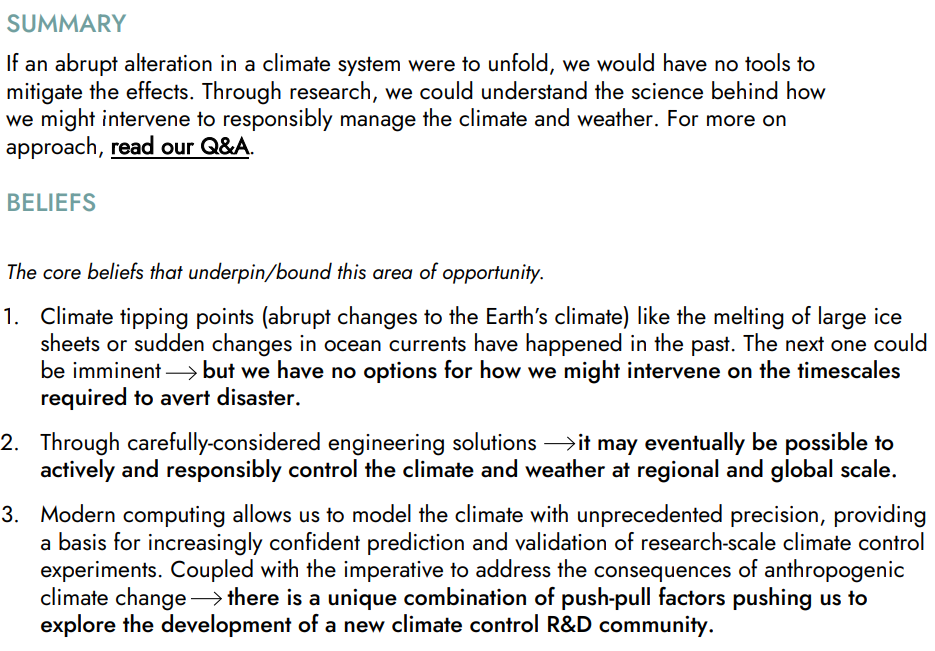Through its Advanced Research and Invention Agency (ARIA), the UK is exploring how to control the weather through technology and geoengineering.
Last week, the UK’s DARPA-inspired research agency published an opportunity space document entitled, “Managing our climate and weather through responsible engineering,” which was authored by ARIA program director Mark Symes.
Under the “core beliefs” section that underlies this research opportunity, Symes writes:
“Through carefully-considered engineering solutions it may eventually be possible to actively and responsibly control the climate and weather at regional and global scale”
As far as methods into controlling the weather go, Symes cites studies that involve:
- Blocking the sun as a potential means to cool global land temperatures.
- Solar Radiation Management (SRM) techniques, which “reflect a small percentage of the sun’s light and heat back into space.”
- “Cirrus Cloud Thinning,” which theoretically would “allow more longwave radiation to escape to space.”
Symes believes that one or more funding programs could emerge from his opportunity space document, which he says will be updated over time.

On December 6, ARIA published a Q&A with Symes and ARIA CEO Ilan Gur, where they elaborated on the latest research opportunity.
Both agreed that decarbonization and net-zero were “most important to address climate change.”
However, Symes argued that:
“Even if we stopped burning fossil fuels tomorrow and no more CO₂ from human activity entered the atmosphere, the world would continue to warm due to the CO₂ that is already in the atmosphere”
Gur said that he wanted to hear from scientists and engineers on “how we might intervene responsibly in climate and weather systems” while warning that climate engineering experiments could be carried out “without the fundamental science to underpin them.”
“We should also recognize that the technological ability and desire to intervene in climate and weather systems is increasing across the globe,” said Gur, adding:
“There is the risk that climate engineering experiments will be carried out, but without the fundamental science to underpin them”
“The UK is uniquely positioned to advance our understanding of these approaches, towards a framework for approaching their development and use responsibly,” the ARIA CEO concluded.
The UK Advanced Research and Invention Agency named its first cohort of eight program directors in September.
At that time, Symes was asking:
- Can we develop the capability to control the weather and climate on a regional and global basis, to mitigate or obviate hurricanes, droughts, floods and heatwaves?
- What are the options for actively cooling the Earth, and how can we improve our monitor-measure-predict feedback loops to identify the most responsible choices?
Now, Symes is asking:
“Are there technologies that could allow us to intervene in the shorter term, both to avoid catastrophic tipping points and to mitigate against extreme weather events like floods or hurricanes, which are only getting worse as global temperatures rise?”
ARIA is a non-departmental public body, sponsored by the UK Department for Science, Innovation and Technology that bills itself as “an R&D funding agency built to unlock scientific and technological breakthroughs which could benefit everyone” by “empowering scientists to reach for the edge of the possible.”
Last September, founding CEO Ilan Gur said of ARIA, “From a policy perspective ARIA was built inspired by DARPA — the funding organization in the US that really catalyzed entire new areas like computing and the internet, and GPS technology, and more recently mRNA.”
Previously, Gur was a director at the US Advanced Research Projects Agency for Energy (ARPA-E), and on top of being a Schmidt Futures Innovation Fellow, he is also the founder of Activate.org, a US-based organization that empowers scientists and engineers to bring ground-breaking research to market.











